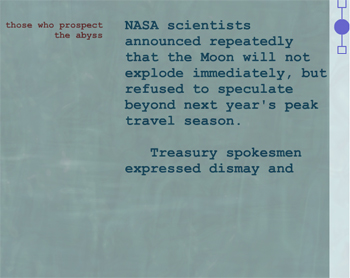Suggestions for Play
"Deep Surface" is based on a simple-minded metaphor: what if the pages of a book -- or more accurately, the SO_CALLED PAGES OF THE WEB -- were made from some pliable fluid, like water, so that we could dive gradually from one plane of presentation to the next?

Diving -- or changing the depth of your reading -- is accomplished in this system by the simple act of pointing and clicking (as what these days is not?). When you click, anywhere on the screen, you set a dive point. The system will descend gradually until that point is reached.
You may hover or move again, up or down. You may even interrupt a dive or ascent already in progress, to choose a new destination.
Position is indicated by a circular marker, the dive bubble, which expands and contracts to remind you that breathing is important (and, paradoxically, that it is hard to breathe underwater). Below and above this indicator you will see lines stretching up and down, measuring your progress. The open box below the dive bubble marks the set point of the current descent.
The box above the bubble marks the surface, and is there to indicate that the lifeline is active, as it always is when the system starts up. The lifeline will automatically return you to the surface when you run low on air.
Once back to the surface -- the uppermost layer of reading -- your air supply will gradually refill.
The amount of air remaining is indicated by the colors of the various indicators. When they are bright blue, you have plenty of air. When they turn red, you need a refill.
After a certain number of position changes (up as well as down), the lifeline becomes inactive. You'll be warned about this by a helpful mermaid. After this change, the top-level indicator and line will no longer be visible. Thereafter, you need keep an eye on your air level. When things start to turn red, head for the surface. If you run out of air while not on the lifeline, you turn immediately into fish food.
What you find in your various descents may divert, surprise, and perhaps frighten -- as you might expect in reef diving.
There are four congeries of more or less coherent prose, which will show up at their own pace, whether you are there to read them or not. You can earn points every time a new word is added to one of these passages, provided the layer you are viewing is at least 30% opaque. You might find here an incentive to hang around in one place, dutifully reading.
On the other hand, that strategy is a good way to miss out on everything else that's going on.
Your score affects behavior of the system in various ways, making it easier for you to dive without the lifeline. It also determines what you see when your luck runs out.
In addition to the prosy bits, a couple of layers contain words in motion. The uppermost of these will tell you a number of interesting things, including what key to press in order to increase your air supply without returning to the surface. Note, however, that the identity of this magic key changes without notice, so it is a good idea to check in with that useful layer whenever you're passing through.At the bottom of it all, of course, there be monsters. What's the point of reading without the risk of monstrous fictions, or inconvenient truths?
So dive in, go deep, and don't forget to tip your mermaids when they sing.